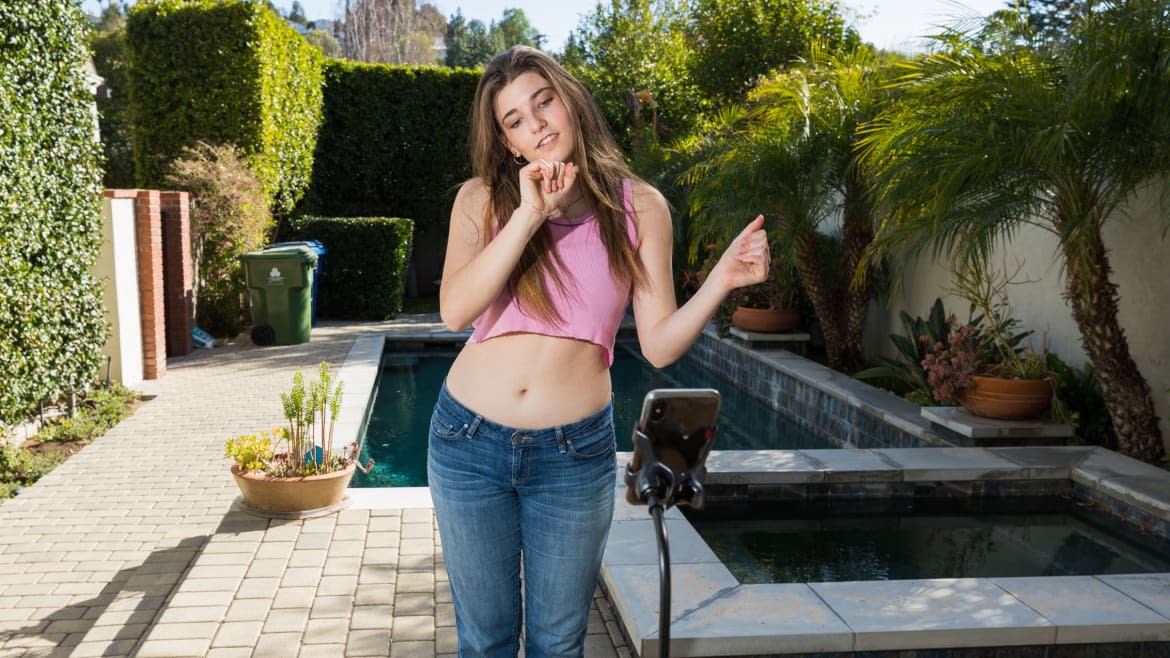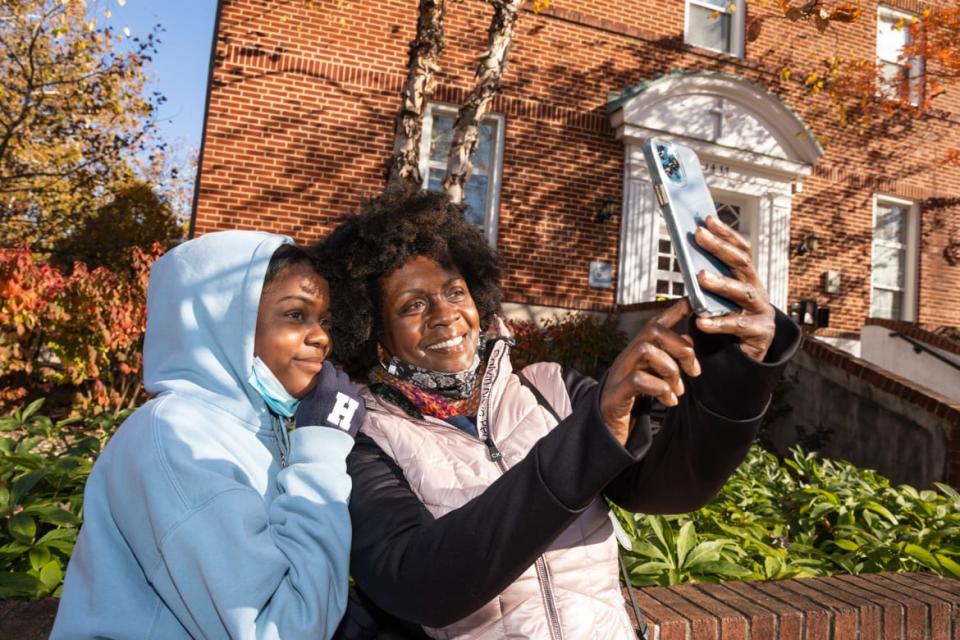Social Media’s Impact on Teens Is Way Worse Than You Think

The kids are really not alright according to Social Studies, a five-part docuseries chronicling a year in the lives of disparate California teenagers and the seismic impact social media has on their day-to-day—and, consequently, on their ideas about themselves, each other, and the world at large.
Lauren Greenfield’s non-fiction endeavor (Sept. 27, on FX) shines a spotlight on growing up in the age of smartphones, Snapchat, TikTok, and Instagram. What it reveals is a scary new reality in which everything good and bad about pre-adulthood has been exacerbated by being constantly, addictively online. It may end hopefully, but the road to that relatively upbeat conclusion is paved with all manner of misery that will make parents consider becoming Luddites.
"Social media is our lifeline, but also a loaded gun,” says Jonathan, a 17-year-old senior at Los Angeles’ Palisades Charter High School, which many of Social Studies’ boys and girls either recently graduated from or currently attend. Director Greenfield convinced her numerous subjects to record their screens in order to provide a window into their daily digital interactions with friends, families, and strangers. Such access is illuminating in and of itself. Just as enlightening, though, are these teens’ candid conversations about the ups and downs of their 21st-century experiences, filled as they are with issues regarding sexism, racism, homophobia, insecurity, anxiety, sexual assault, bullying, body-image pressures, and college mania—just to name a few.
Over the course of its five installments, Social Studies gets to know a wide variety of kids and, by doing so, touches upon just about every topic that makes this phase of life so difficult, scary, and exciting. Set in 2021-2022, it begins with the return to in-person learning following a year of COVID-19 quarantining, during which time isolation has driven teens to rely even further on their Apple and Android devices for social interaction, expression, and stimulation. Despite being together again in classrooms, phones are always at the ready in Social Studies, facilitating dialogue, get-togethers, and consumption of myriad disparate things, be it fashion and beauty products or humor and pornography—the last of which, many acknowledge, has warped boys’ perspectives on sex, resulting in demands for, and pressure to go along with, extreme behavior for which most are unprepared.
Greenfield profiles a grab bag of kids in Social Studies, some of whom participate in roundtable chats about the biggest dilemmas and challenges they face, as well as the means by which social media amplifies their importance (and trickiness). With their entire peer group using these platforms, being online is vital, and yet the interconnectivity they get inevitably results in exposure to ugliness. Social media is a vehicle for, among other things, setting beauty standards that can’t be reached by most, leading to shame, self-harm, and eating disorders; establishing social hierarchies and power dynamics designed to exclude and denigrate; different forms of harassment, whether it’s through slanderous comments, doxxing, humiliating photos, or revenge porn; and lying, betrayal, and cheating.
Of course, a lot of these problems existed before everyone had a “Finsta.” Yet Social Studies’ perceptive portrait illustrates how much they’ve intensified courtesy of these services. The desire for attention and acceptance compels many (such as 15-year-old Jordan and University of Arizona freshman Sydney) to post sexually explicit pics for their followers, and a handful confess that they’ve been asked to (and, in some cases, have) sent nudes to those requesting them. For others, social media affords a platform for entrepreneurial advancement, as with TikTok star-turned-party host Jack and DJ and aspiring musician Keyshawn, the latter of whom is soon juggling work and fun with fatherhood. For 16-year-old Bella, meanwhile, social media became a battlefield, thanks to a former friend who waged a nasty campaign against her after Bella kissed her boyfriend.

"Social Studies -- “Social Divisions” -- Episode 2 (Airs Friday, September 27th) -- Pictured: (l-r) Jordan and Karen. CR: Lauren Greenfield/INSTITUTE."
In these and numerous additional instances, Social Studies exposes these sites as hellscapes where anonymous vitriol, duplicity, and vengeance can be carried out with minimal ramifications—even when such horror spills into the real world. Just as detrimentally, Greenfield underscores how insidiously their images and videos promote harmful views of women, romance, friendship, community, and health, such that there are whole segments of TikTok dedicated to celebrating anorexia and suicide.
Predictably, they also glamorize attractiveness and celebrity as the highest ideals, thereby convincing teens that engagement (via likes, follows, and reposts) is not simply the path to becoming more popular, but to achieving global fame, such that 15-year-old Maren admits that she’d do as Kim Kardashian did and release a sex tape if it would help her net a fortune.
The struggles of Black students trying to find their place in predominantly white schools, and of transgender individuals coping with unaccepting parents, factor into Social Media, as does technology’s dominant role in romantic and sexual relationships—to the point that many kids now think that giving their partners access to social media passwords is a way to demonstrate trust.
These students are grappling with relatable and universal thoughts and feelings, and Greenfield’s series highlights how that process is complicated by these platforms, given that they shorten attention spans, create a constant hunger for validation (and spawn depression when it’s not received), spread fake news, and normalize nastiness that wouldn’t be acceptable in any other arena.
Social Studies stays neutral throughout, allowing its kids’ choices, triumphs, and failures to dictate where its stories go and what they say about how we live today. In doing so, it presents examples of social media being a constructive force, as when 20-year-old Anthony attempts to hold unpunished rapists accountable by outing them on Snapchat, complete with their photos, addresses, and parents’ phone numbers.
For the most part, however, the series is a harrowing study of modern technology’s major influence on Generation Z and all those that will follow in its wake. The fact that Greenfield’s subjects by and large turned out OK (for now) suggests that, as with all prior revolutions, humans will adapt to this new paradigm. Still, it says something about social media that even its users know, while refusing to give it up, that it’s a net negative in their lives.
Get the Daily Beast's biggest scoops and scandals delivered right to your inbox. Sign up now.
Stay informed and gain unlimited access to the Daily Beast's unmatched reporting. Subscribe now.


